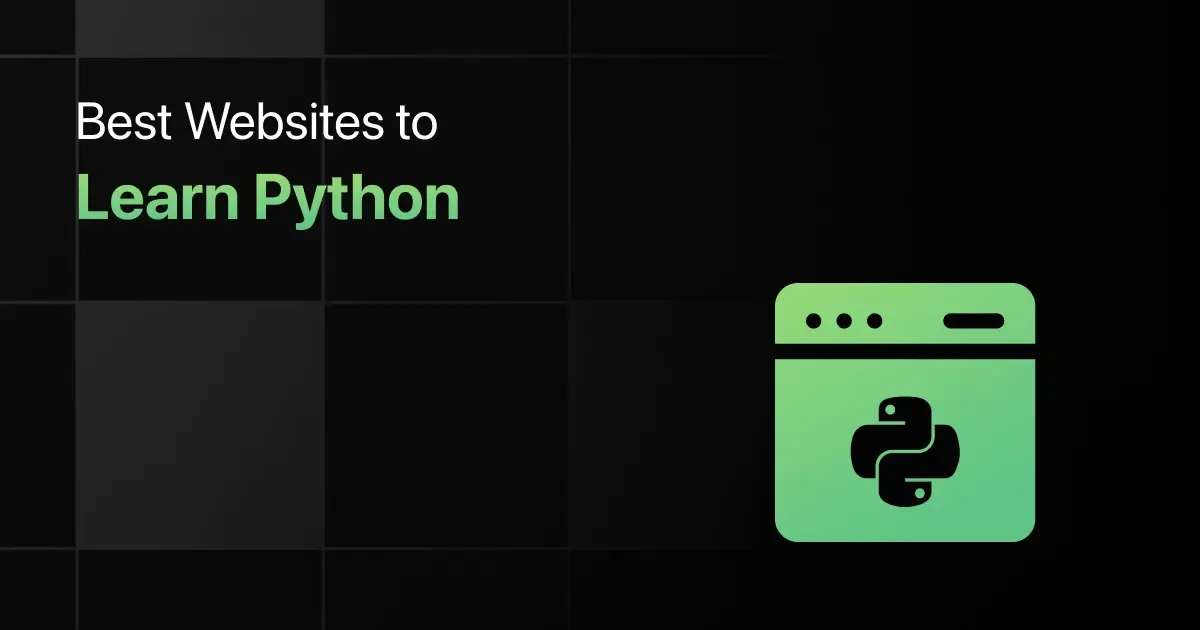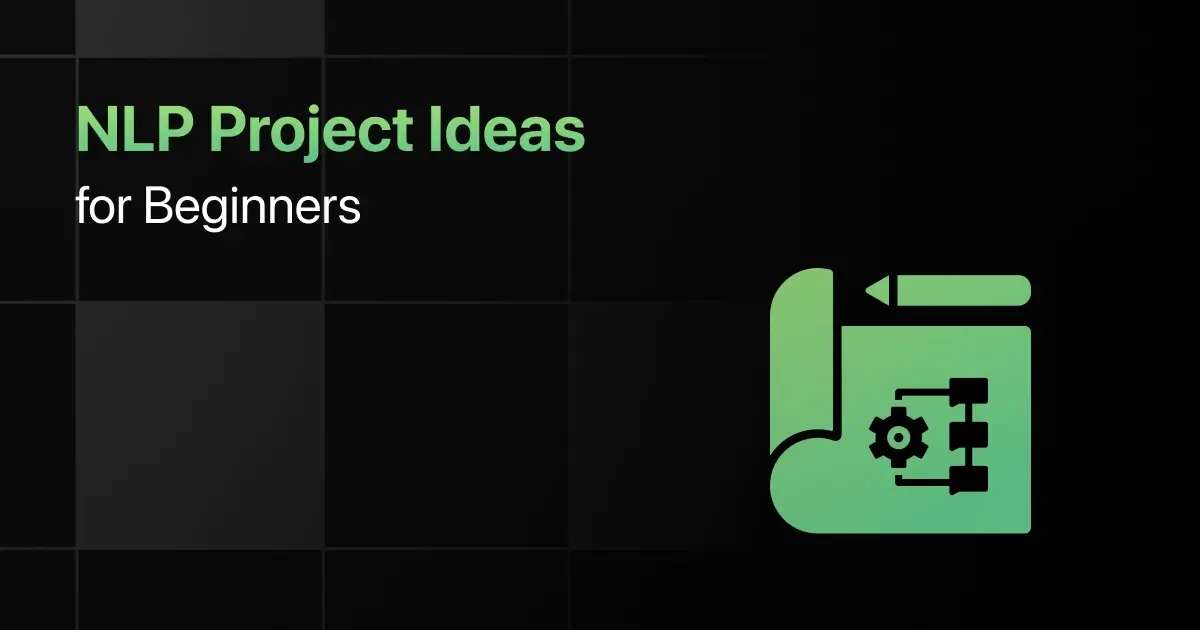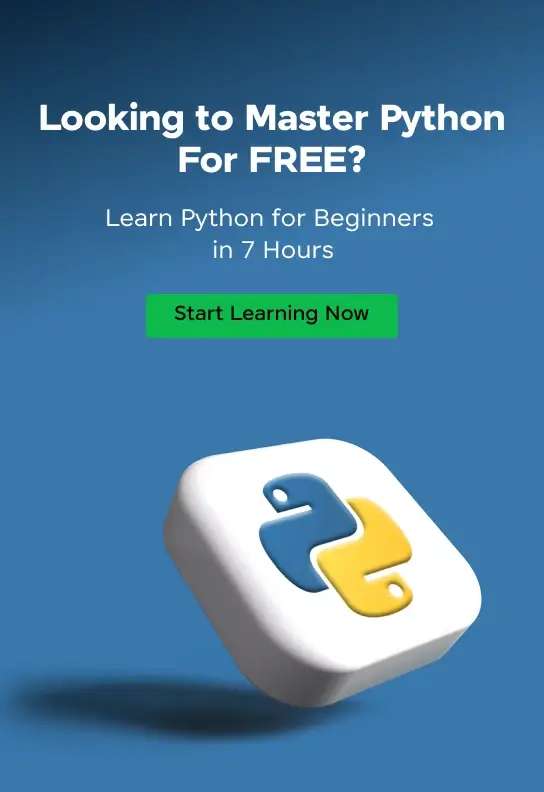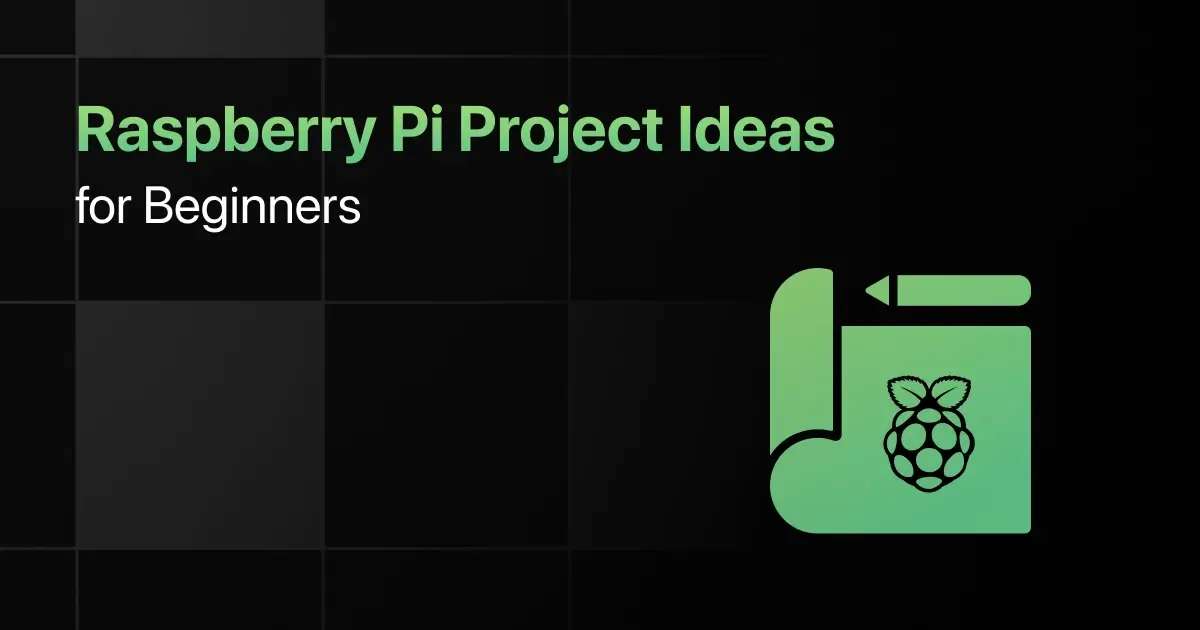Best Websites to Learn Python Programming

Curious about Python and looking for a budget-friendly way to learn? You’re in luck!
The best websites to learn Python programming for free are just a few clicks away, offering a treasure trove of resources to kickstart your coding adventure without costing a penny.
10 Best Websites for Python – Overview
Here’s an overview of the top 10 websites to learn Python:
| S.No. | Website Name | Course Duration | Pricing | Certification | Website Link |
|---|---|---|---|---|---|
| 1 | GUVI | 7 hours | Freemium | Yes | Visit Now |
| 2 | DataCamp | 24 hours | Paid | Yes | Visit Now |
| 3 | Codecademy | 25 hours | Freemium | Yes | Visit Now |
| 4 | Coursera | 18 hours | Paid | Yes | Visit Now |
| 5 | edX | 9 weeks | Freemium | Yes | Visit Now |
| 6 | W3Schools | Self-paced | Free | No | Visit Now |
| 7 | Udemy | Varied | Paid | Yes | Visit Now |
| 8 | Microsoft Learn | 4 hours | Free | No | Visit Now |
| 9 | SoloLearn | Self-paced | Free | Yes | Visit Now |
| 10 | FreeCodeCamp | 5 hours | Free | No | Visit Now |
Best Websites to Learn Python Programming for Beginners
Below is the list of best websites to learn Python for beginners:
1. GUVI
GUVI is an innovative ed-tech platform focused on providing personalized programming and technology courses, with a strong emphasis on Python programming.
It offers an in-depth Python course that guides learners from basic syntax to advanced programming techniques, enabling them to master data handling, analysis, and visualization.
Course Diversity: Offers beginner to advanced courses in Python, covering all aspects including data handling and visualization.
Learning Style: Self-paced online learning with recorded content, practical exercises, and interactive gamified platforms like Codekata, Webkata, and IDE.
Pricing Structure: Freemium course is free but for certification, there is a fee.
Platform Usability: User-friendly interface with easy navigation to course materials, forums, and resources.
Certifications Offered: Provides industry-recognized certifications affiliated with IIT-M.
Language Options: Available in multiple languages, including English, Hindi, Tamil, Marathi, and up to 10 regional languages.
Instructor Expertise: Courses are crafted and taught by experienced industry professionals.
Duration of Courses: 7 hours of recorded content
Community and Support: Offers a dedicated support forum and a community of learners for collaborative learning and doubt resolution.
2. DataCamp
DataCamp’s Python Programming track is a specialized journey into Python, aimed at improving programming skills with a focus on code optimization, function writing, and software engineering best practices.
Learners will delve into efficient code execution, best practices in function writing, and mastering unit tests, all while using popular Python packages like pandas and NumPy.
Course Diversity: Focuses on Python code optimization, function writing, and software engineering best practices, suitable for intermediate learners.
Learning Style: Hands-on learning with real-world coding exercises and projects.
Pricing Structure: Subscription-based access, with plans starting form $12 monthly.
Platform Usability: Clean, intuitive interface with structured courses for easy navigation and progress tracking.
Certifications Offered: Statement of Accomplishment provided upon course completion.
Language Options: Primarily English.
Instructor Expertise: Courses taught by industry professionals and experienced educators.
Duration of Courses: 24 hours across 6 courses
Community and Support: Access to a large community of learners and professionals, with forum support.
3. Codecademy
Codecademy’s Learn Python 3 course is a comprehensive and interactive journey into Python programming, designed for learners at all levels.
Starting with the basics, the course covers Python 3’s fundamental concepts, including control flow, data structures, and various projects for practical application. It emphasizes hands-on learning, allowing students to write and execute code directly in the browser.
Course Diversity: Covers Python basics to advanced topics, including control flow and data structures.
Learning Style: Interactive and hands-on learning. Students can do code writing and execution directly in the browser.
Pricing Structure: Free content is available and paid plans offer additional projects, quizzes, and certification.
Platform Usability: User-friendly and interactive, the platform encourages active learning through coding exercises.
Certifications Offered: Certificate of completion is available with paid plans.
Language Options: Primarily in English.
Instructor Expertise: Developed by experienced programmers and educators.
Duration of Courses: Approximately 25 hours, self-paced.
Community and Support: Vibrant community, forums for support, and additional learning resources.
4. Coursera
Coursera’s “Programming for Everybody” course, offered by the University of Michigan, is designed to teach the basics of programming using Python.
It is aimed at beginners and covers fundamental concepts such as Python syntax, variables, functions, and loops. The course is structured to be accessible to anyone, regardless of their prior programming experience, and focuses on constructing simple programs in Python.
Course Diversity: The course is designed for beginners, covering Python fundamentals like syntax, variables, functions, and loops.
Learning Style: Combines video lectures, readings, and quizzes for a comprehensive learning experience and users can learn with a flexible schedule.
Pricing Structure: Free enrollment with an option to purchase a certificate.
Platform Usability: User-friendly interface with easy access to course materials and forums for discussion and support.
Certifications Offered: Shareable certificate available for purchase
Language Options: Taught in English with subtitles in 22 languages.
Instructor Expertise: Taught by Charles Russell Severance, a respected instructor from the University of Michigan.
Duration of Courses: Approximately 18 hours to complete.
Community and Support: Access to a vast community of learners and engagement opportunities through discussion forums.
5. edX
edX offers a diverse range of courses, including a comprehensive introduction to computer science and programming using Python 3.5. This course, designed for students with no prior exposure to computer science, featuring lecture videos, exercises, and problem sets.
The course is taught by esteemed MIT faculty, ensuring high-quality instruction and a robust learning experience for beginners in the field.
Course Diversity: Offers a comprehensive introduction to computer science and programming using Python 3.5, designed for students with no prior exposure to computer science.
Learning Style: Instructor-led, paced course with a structured schedule, featuring lecture videos, exercises, and problem sets.
Pricing Structure: Free to enroll with an optional upgrade available for a verified certificate.
Platform Usability: User-friendly interface with easy navigation and easy access to course materials.
Certifications Offered: Verified certificate available for an additional cost, with eligibility for college credit through Charter Oak State College.
Language Options: Course and video transcripts are available in English.
Instructor Expertise: Taught by esteemed MIT faculty, including John Guttag, Eric Grimson, and Ana Bell, ensuring high-quality instruction.
Duration of Courses: 9 weeks, with an estimated effort of 14–16 hours per week.
Community and Support: Offers a robust community and support system, including FAQs and edX support for technical and course-related queries.
6. W3Schools
W3Schools is a renowned online learning platform that offers a wide array of tutorials in various programming languages, including Python.
The tutorials cover fundamental Python topics such as syntax, file handling, and database operations. W3Schools is an ideal resource for those looking to learn Python through self-paced, hands-on exercises.
Course Diversity: Covers a range of Python topics from basics to advanced, including file and database handling.
Learning Style: Self-paced with interactive “Try it Yourself” editor for practical coding experience.
Pricing Structure: Free tutorials; optional paid certification.
Platform Usability: Simple, user-friendly interface suitable for beginners.
Certifications Offered: Python certification is available for a fee.
Language Options: Primarily in English.
Instructor Expertise: Tutorials developed by knowledgeable experts in the field.
Duration of Courses: Flexible duration, self-paced learning.
Community and Support: Offers general forums for discussion and support.
7. Udemy
Udemy is a versatile online learning platform offering a vast range of courses across various fields, including technology, business, and personal development.
In their Python courses, learners can explore everything from basic programming concepts to advanced applications, taught through engaging video lectures and interactive exercises.
Course Diversity: Wide range, from beginner to advanced Python courses.
Learning Style: Video lectures, quizzes, coding exercises, and projects.
Pricing Structure: Individually priced courses, often with discounts.
Platform Usability: User-friendly with easy access to materials and progress tracking.
Certifications Offered: Certificate of completion for all courses.
Language Options: Primarily in English, subtitles in other languages for some courses.
Instructor Expertise: Taught by industry professionals and experienced educators.
Duration of Courses: Varies, from a few hours to over 50 hours.
Community and Support: Q&A sections, community forums for broader discussions.
8. Microsoft Learn
Microsoft Learn’s “Python for beginners” course is a comprehensive learning path designed to introduce the basics of Python programming.
The course is ideal for those starting their journey in programming, covering fundamental topics such as strings, math, lists, loops, dictionaries, and functions. With a focus on practical applications, the course includes hands-on exercises and projects, allowing learners to create programs and become familiar with Python’s core elements.
Course Diversity: Structured learning path covering Python basics like strings, math, lists, loops, dictionaries, and functions.
Learning Style: Self-paced modules with hands-on exercises, focusing on practical applications.
Pricing Structure: Free access to all learning materials and modules.
Platform Usability: Well-organized content, clear progression path, easy for beginners.
Certifications Offered: Does not specify certifications for this course.
Language Options: Content available in English.
Instructor Expertise: Leverages Microsoft’s expertise in technology and education.
Duration of Courses: Estimated 4 hours and 39 minutes, divided into 10 modules.
Community and Support: Comprehensive FAQ & Help section provided.
9. SoloLearn
SoloLearn’s “Introduction to Python” course is designed to provide a comprehensive and accessible entry into the world of Python programming.
The course covers foundational concepts of coding with Python, including working with strings to store text data and handle special characters, making programs interactive through user inputs, and using variables for data storage. It also delves into conditional statements like “if” and “else” to shape the flow and purpose of programs, and teaches how to create and operate with lists for handling multiple types of data.
This course is a great starting point for anyone new to programming and looking to understand the basics of Python.
Course Diversity: Focuses on foundational coding concepts in Python, suitable for beginners.
Learning Style: Bite-sized daily lessons with fun practice exercises and a supportive community.
Pricing Structure: Free access to the course.
Platform Usability: User-friendly and designed for ease of use.
Certifications Offered: Free completion certificate offered.
Language Options: Primarily in English.
Instructor Expertise: Curriculum developed by experts in the field.
Duration of Courses: Self-paced, allowing learners to progress at their preferred speed.
Community and Support: Strong community support with forums and discussions.
10. FreeCodeCamp
FreeCodeCamp’s Python programming course, created by Beau Carnes, is a comprehensive and beginner-friendly guide to learning Python.
The course is designed for individuals with no prior programming experience and is accessible through the FreeCodeCamp.org YouTube channel. It covers all core aspects of Python, including variables, expressions, statements, data types, operators, control statements, functions, and object-oriented programming.
The course is structured to simplify complex topics and includes practical projects like creating a rock-paper-scissors game and a blackjack game, which serve as hands-on learning experiences.
Course Diversity: Comprehensive course covering all core aspects of Python, suitable for beginners.
Learning Style: Video-based learning on YouTube with practical coding exercises.
Pricing Structure: Completely free.
Platform Usability: Hosted on YouTube, easy to access and follow along.
Certifications Offered: No certificates for completing the course; certification available for completing learning paths on their website.
Language Options: Content in English.
Instructor Expertise: Created by Beau Carnes, known for popular programming courses.
Duration of Courses: A 5-hour long course.
Community and Support: Vast community of learners and developers on their platform and forums.
Final Words
These websites are like your personal, cost-free coding tutors, packed with all the Python essentials you need to start coding. They’re the perfect blend of fun and learning, making your programming journey both enjoyable and affordable.
Keep checking this article as we will keep updating this space as more websites make space in the heart and study schedule of students preparing for placements and competitive exams.
Explore More Python Resources
- Python Practice Websites
- Python YouTube Channels
- Python Project Ideas
- Python Apps
- Python IDEs
- Python MCQs
Explore More Websites
- Java
- Coding
- C++
- C Programming
- SQL
- JavaScript
- Data Science
- HTML & CSS
- Web Development
- Data Structures and Algorithms
- AI & Machine Learning
- Ethical Hacking
- Android Development
- React JS
- Game Development
- Competitive Programming
- Digital Marketing
- Tableau
- DBMS
- R Programming
- PHP
- Cyber Security
- Excel
- Node JS
- Data Analytics
- Bootstrap
- Cloud Computing
- Operating System
- Angular
- RPA
FAQs
The best websites for learning python are:
- GUVI
- DataCamp
- Codecademy
- Coursera
- edX
- FreeCodeCamp
Coursera, edX, SoloLearn, FreeCodeCamp, and Microsoft Learn are some free python learning websites along with certifications.
You should choose a website for learning python because they offer flexibility and have a variety of learning resources. They cater to different learning styles with interactive tutorials, video lectures, and hands-on exercises.
You can choose the right website for learning python by considering factors like course content quality, learning style compatibility (videos, interactive exercises), instructor expertise, community support, and pricing.
Yes, beginners can effectively learn Python through websites. Many platforms offer beginner-friendly courses that start with basics and gradually progress to more complex topics.
Yes, some websites provide Python learning content in multiple languages. For example, Coursera and Udemy offer courses in various languages with subtitles, catering to a global audience.
Related Posts



Golang Interview Questions
Are you preparing for your first Golang interview and wondering what questions you might face? Understanding the key Golang interview questions …
Warning: Undefined variable $post_id in /var/www/wordpress/wp-content/themes/placementpreparation/template-parts/popup-zenlite.php on line 1050








